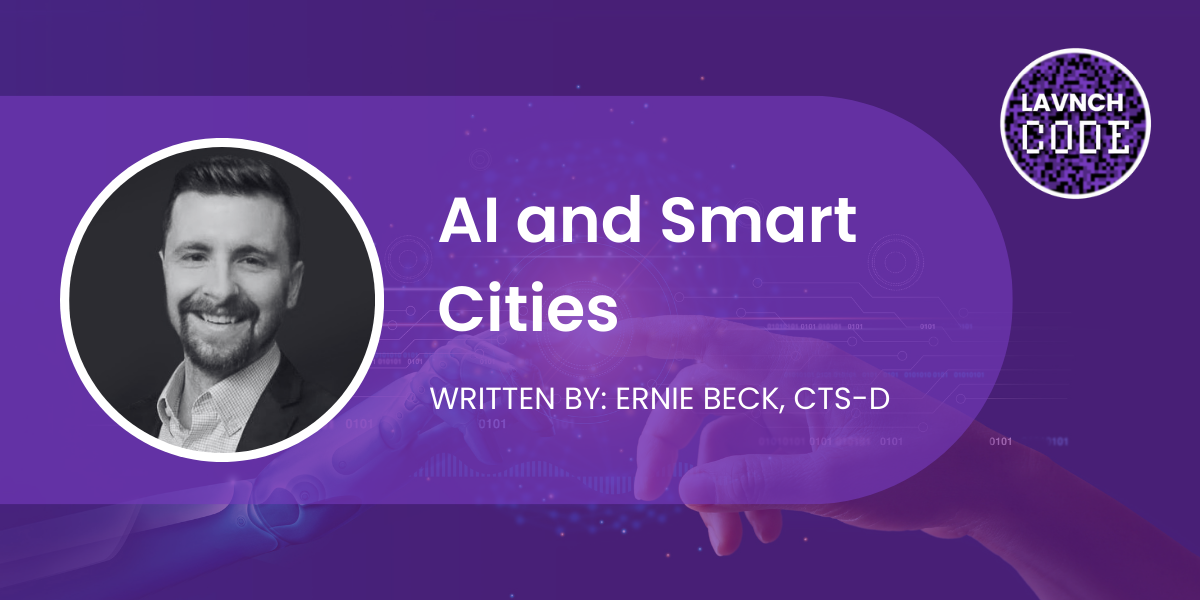
AI and Smart Cities

There’s no doubt that the term artificial intelligence (AI) has become part a major hot topic in technology circles, and now in numerous main stream media stories. Many of these trumping up fears about AI replacing jobs, or worse turning into general AI (that is, human-level AI that possesses the ability to self-learn and apply knowledge across different tasks). While these stories blur the line between sensational, hopeful, and fear mongering, I’d like to pose a more positive perspective on how AI can help humanity.
Earlier this year, I was featured in a LAVNCH [CODE] article titled “What is a Smart City?” If you haven’t read that yet, I suggest you start there. This naturally leads to the question: how we can leverage AI for realizing the net benefits of developing smarter cities? First thing to consider is that the term AI has multiple definitions. From narrow AI voice assistants like Siri, to large language models like ChatGPT, to machine learning (ML) algorithms, AI takes on many forms and functions. To keep things simple, this article will use AI as an umbrella term to encompass all the different applications we’ll explore, understanding some may use multiple forms of AI to accomplish a task. So, let’s look at a few ways in which AI can be utilized to make a city smarter.
Smart Public Safety and Security: AI can enhance public safety and security by enabling intelligent surveillance, threat detection, and emergency response systems. AI-powered video analytics can analyze real-time video feeds to detect suspicious activities, identify objects, or recognize specific behavior patterns. AI algorithms can also analyze social media data, sensor data, and other sources to identify potential security threats or patterns that require attention. This enables faster response times and more effective resource allocation for emergency services. However, this could quickly go from feeling like enhancing public safety to Big Brother and government overreach very quickly. This highlights the need to balance safety enhancements with community input and transparency around data governance.
Intelligent Public Transportation Systems: AI can optimize and enhance urban transportation networks, leading to reduced congestion, improved traffic flow, and enhanced safety. AI algorithms can analyze real-time data from various sources, including sensors, cameras, and GPS devices, to optimize traffic signal timings, predict traffic patterns, and provide intelligent routing suggestions. For those who have traveled around cities like San Francisco, Phoenix, or Los Angeles, you’ll see Waymo autonomous taxis puttering around. AI-powered systems can also support a future of autonomous vehicles, enabling efficient and safe transportation during a transition from manned-autos to autonomous traffic flows, thus reducing the anxiety about safety.
Intelligent Energy Management: According to ASE.org, buildings account for nearly 40% of all energy consumed in the U.S. New York City is implementing local law 97, which will set more strict sustainability requirements for buildings. AI can play a crucial role in optimizing energy usage and promoting sustainability goals of a city. Machine learning algorithms could analyze energy consumption patterns, weather data, and pedestrian data to optimize energy distribution and reduce waste. AI can help identify energy-saving opportunities, monitor, and manage energy grids more effectively, and facilitate the integration of renewable energy sources into the grid. Ideally, this would help smooth out the various peak and off-peak energy times, which would have a greater impact on grid resiliency.
Predictive Maintenance and Infrastructure Management: As a longtime resident of the Baltimore, MD, I can tell you firsthand that numerous watermain breaks have impacted the quality of life for residents. With an aging 75+ year old water infrastructure in dire need of an update, AI can be used to monitor and maintain critical infrastructure systems like water networks and public facilities and help prioritize trouble zones. By analyzing data from sensors and IoT devices, AI algorithms can identify patterns and anomalies to predict potential failures or maintenance requirements. This would allow Baltimore City authorities to proactively address issues, reduce downtime, improve the health and safety of residents, and allocate resources more efficiently.
These are just a few examples of how AI can contribute to making a city smarter. Big cities come with big challenges, and AI is an incredibly powerful tool for creating efficiencies at city-sized scales leveraging large data sets. The opportunities are seemingly endless but it requires forward-thinking leadership to fund, pilot, promote AI-based smart city initiatives. Of course, the specific use cases depend on the unique needs and priorities of each city, but there should be no question that a smart city is only possible if AI is part of the equation.
Editor’s Note: This blog is part of a series for Artificial Intelligence (AI) Appreciation Day, which is held annually on July 16. Click here to read more AI Day stories from LAVNCH [CODE] and click here to read more AI Day stories from rAVe [PUBS].

Ernie Beck
About the Author: Ernie Beck is NV5’s resident intelligent building specialist, working collaboratively with clients to consider scalable communications infrastructure, converged networks, cybersecurity, data collection and analytics, health and safety, and enhanced occupant experiences in their projects. Having spent over a decade as a consultant in the AV/IT industry, Beck brings an understanding of real-world challenges posed by complex technology deployments. Beck serves as lecturer in the Harvard University’s Graduate School of Design’s Executive Education program, focused on the development and delivery of the Advanced Technologies for High-Performance Buildings program. He resides in Maryland with his family and volunteers as a youth sports coach for various teams in the local recreation council.








